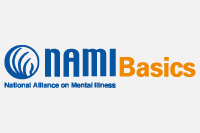
Pandemic may be Linked with Inflammatory Brain Markers, Mood Changes
February 16, 2022
Many people have felt the mental health effects of the COVID-19 pandemic, and new research indicates that even individuals who never contracted the illness may experience stress-related changes in brain function. Researchers used brain imaging and other health metrics to compare “pre-pandemic” and “pandemic” data for individuals who tested negative for SARS-CoV-2 antibodies. Even in these healthy individuals, the data showed elevated levels of inflammatory markers associated with mood issues and fatigue following 2020 lockdown measures. To learn more, see the study in Brain, Behavior, and Immunity, and take a look at NAMI’s Mental Health by the Numbers for additional information on the pandemic’s impact on mental health.

Randomized Controlled Trial finds NAMI Basics Effective for Caregivers of Children with Mental Health Symptoms
January 18, 2022
NAMI Basics is a no-cost education program for parents, caregivers and others who provide care for youth experiencing mental health symptoms. For the first time, the effectiveness of NAMI Basics was tested using a randomized controlled study design. Caregivers were randomly assigned to either a 6-week, peer parent-led NAMI Basics course, or an 8-week waitlist. At the end of the study, caregivers participating in the NAMI Basics course showed increased engagement with their child’s symptoms and intentions to seek out services compared with the waitlist group. Participating caregivers also reported decreased intrapersonal and interpersonal distress among their children. To learn more, see the study in Psychiatric Services.

Mobile Phone-Based Mental Health Interventions Show Positive – but Modest – Results
January 18, 2022
Mobile phone-based mental health interventions have gained popularity as a potential solution to the cost and access issues of traditional mental health care. A new study analyzed previous research on such interventions, including 145 studies involving 48,000 participants, to determine whether they benefit users as designed. Overall, the study found modest positive results for certain conditions – such as anxiety and depression – but little evidence that mobile-phone based interventions are as effective or more effective than traditional care. More rigorous studies, including a full exploration of potential negative outcomes, are necessary to understand the impact of these interventions. To learn more, see the study in PLOS Digital Health.

Access to Gender-Affirming Hormone Therapy Associated with Better Mental Health Outcomes Among Transgender Adults
January 12, 2022
Transgender individuals often face significant mental health challenges, including a higher risk of suicide compared to their cisgender peers. In a recent analysis of data from the 2015 U.S. Transgender Survey, researchers explored the link between receiving gender-affirming hormone therapy (GAH) in adolescence or adulthood and future mental health outcomes. Among adults who indicated that they had ever desired GAH, those who had received it at any point in their life were less likely to report suicidal behavior in the past year or severe psychological distress in the past month. Further, those who received GAH in adolescence (age 14-17) experienced better mental health outcomes than those who received GAH in adulthood. To learn more, see the study in PLOS One.

